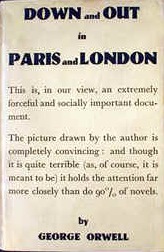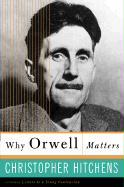Related Research Articles

Animal Farm is a beast fable, in the form of a satirical allegorical novella, by George Orwell, first published in England on 17 August 1945. It tells the story of a group of anthropomorphic farm animals who rebel against their human farmer, hoping to create a society where the animals can be equal, free, and happy. Ultimately, the rebellion is betrayed and, under the dictatorship of a pig named Napoleon, the farm ends up in a state as bad as it was before.

Eric Arthur Blair was an English novelist, essayist, journalist, and critic who wrote under the name George Orwell. His work is characterised by lucid prose, social criticism, opposition to totalitarianism, and support of democratic socialism.

Keep the Aspidistra Flying, first published in 1936, is a socially critical novel by George Orwell. It is set in 1930s London. The main theme is Gordon Comstock's romantic ambition to defy worship of the money-god and status, and the dismal life that results.

Crucifixion is a method of capital punishment in which the condemned is tied or nailed to a large wooden cross, beam or stake and left to hang until eventual death. It was used as a punishment by the Persians, Carthaginians, and Romans, among others. Crucifixion has been used in some countries as recently as the early 20th century.

Down and Out in Paris and London is the first full-length work by the English author George Orwell, published in 1933. It is a memoir in two parts on the theme of poverty in the two cities. Its target audience was the middle- and upper-class members of society—those who were more likely to be well educated—and it exposes the poverty existing in two prosperous cities: Paris and London. The first part is an account of living in near-extreme poverty and destitution in Paris and the experience of casual labour in restaurant kitchens. The second part is a travelogue of life on the road in and around London from the tramp's perspective, with descriptions of the types of hostel accommodation available and some of the characters to be found living on the margins.

Homage to Catalonia is George Orwell's personal account of his experiences and observations fighting in the Spanish Civil War for the POUM militia of the Republican army.

Coming Up for Air is the seventh book and fourth novel by English writer George Orwell, published in June 1939 by Victor Gollancz. It was written between 1938 and 1939 while Orwell spent time recuperating from illness in French Morocco, mainly in Marrakesh. He delivered the completed manuscript to Victor Gollancz upon his return to London in March 1939.

"Shooting an Elephant" is an essay by British writer George Orwell, first published in the literary magazine New Writing in late 1936 and broadcast by the BBC Home Service on 12 October 1948.
Eileen Maud Blair was the first wife of George Orwell. During World War II, she worked for the Censorship Department of the Ministry of Information in London and the Ministry of Food.

Burmese Days is the first novel by English writer George Orwell, published in 1934. Set in British Burma during the waning days of empire, when Burma was ruled from Delhi as part of British India, the novel serves as "a portrait of the dark side of the British Raj." At the centre of the novel is John Flory, "the lone and lacking individual trapped within a bigger system that is undermining the better side of human nature." The novel describes "both indigenous corruption and imperial bigotry" in a society where, "after all, natives were natives—interesting, no doubt, but finally...an inferior people".
The British Independent Labour Party sent a small contingent to fight in the Spanish Civil War. The contingent fought alongside the Workers' Party of Marxist Unification (POUM) and included George Orwell, who subsequently wrote about his experiences in his personal account Homage to Catalonia.
"Inside the Whale" is an essay in three parts written by George Orwell in 1940. It is primarily a review of Tropic of Cancer by Henry Miller with Orwell discoursing more widely over English literature in the 1920s and 1930s. The biblical story of Jonah and the whale is used as a metaphor for accepting experience without seeking to change it, Jonah inside the whale being comfortably protected from the problems of the outside world. It was published, alongside two other pieces by Orwell, 11 March 1940 by Gollancz in Orwell's first collection of essays, Inside the Whale and Other Essays.

Why Orwell Matters, released in the UK as Orwell's Victory, is a book-length biographical essay by Christopher Hitchens. In it, the author relates George Orwell's thoughts on and actions in relation to: The British Empire, the Left, the Right, the United States of America, English conventions, feminism, and his controversial list for the British Foreign Office.

Eric & Us is a 1974 memoir by Jacintha Buddicom recalling her childhood friendship with Eric Blair, the real name of author George Orwell. Buddicom first met Blair when he was eleven and he became very close to her family. Their friendship lasted until Blair became a policeman in Burma and the two lost touch. Blair and Buddicom never saw one another again and did not resume contact until 1949, shortly before Orwell's death from tuberculosis.
"As I Please" was a series of articles written between 1943 and 1947 for the British left-wing newspaper Tribune by author and journalist George Orwell.
"Some Thoughts on the Common Toad" is an essay published in 1946 by the English author George Orwell. It is a eulogy in favour of spring.

The bibliography of George Orwell includes journalism, essays, novels, and non-fiction books written by the British writer Eric Blair (1903–1950), either under his own name or, more usually, under his pen name George Orwell. Orwell was a prolific writer on topics related to contemporary English society and literary criticism, who has been declared "perhaps the 20th century's best chronicler of English culture." His non-fiction cultural and political criticism constitutes the majority of his work, but Orwell also wrote in several genres of fictional literature.

Nineteen Eighty-Four is a dystopian novel and cautionary tale by English writer George Orwell. It was published on 8 June 1949 by Secker & Warburg as Orwell's ninth and final book completed in his lifetime. Thematically, it centres on the consequences of totalitarianism, mass surveillance and repressive regimentation of people and behaviours within society. Orwell, a democratic socialist, modelled the authoritarian state in the novel on the Soviet Union in the era of Stalinism, and Nazi Germany. More broadly, the novel examines the role of truth and facts within societies and the ways in which they can be manipulated.
The Indian Imperial Police, referred to variously as the Indian Police or, by 1905, the Imperial Police, was part of the Indian Police Services, the uniform system of police administration in British India, as established by Government of India Act 1858 and Police Act of 1861. It was motivated by the danger experienced by the British during the 1857 rebellion.

A statue of George Orwell by the British sculptor Martin Jennings was unveiled on 7 November 2017 outside Broadcasting House, the headquarters of the BBC, in London.
References
- ↑ Timothy Garton Ash, "The Complete Works of George Orwell" book review Archived September 16, 2011, at the Wayback Machine , The New York Review of Books, 22 October 1998, reproduced at netcharles.com.
- ↑ Bernard Crick, George Orwell: A Life, 1980.
- ↑ In The Road to Wigan Pier , published in 1937, and again in his "As I Please" column in Tribune, 3 November 1944.
- ↑ Orwell, A Kind of Compulsion, p.210
- ↑ Arena, Part One, 31:28-33:56 Collings on Orwell and a hanging